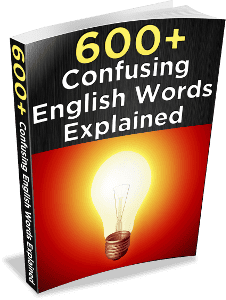
These words seem simple, but there are some grammatical differences between them! Take today’s lesson to find out how to use them all correctly. For more, check out my e-book on 600+ Confusing English Words Explained.
WAIT / AWAIT
Wait and await are both verbs, and they have essentially the same meaning – the difference is in their grammatical structures and formality.
Await is more formal; in everyday English, it’s much more common to use wait.
Await must be followed by an object or event. It cannot be used without an object after it. Also, is not followed by a person:
- The soldiers are awaiting orders. (object)
- We awaited the arrival of the diplomats. (event)
When speaking casually, it’s much more common to use wait for in these cases:
- The soldiers are waiting for orders.
- We waited for the arrival of the products.
- Or: We waited for the products to arrive.
Never use for after await.
Wait can be used alone, with a time period, with to + verb, or with a person. These are all situations in which we can’t use await.
- “Bob’s on a phone call right now; do you want to come back later?”
“No, that’s OK. I’ll wait.”
(alone) - The flight was delayed, so we had to wait for an hour.
(with a time period) - All those people are waiting to get into the nightclub.
(with to + verb) - You’re late. I’ve been waiting for you since 9.
(with a person)
SLEEP / ASLEEP
Sleep can be a verb or a noun:
- The baby is sleeping right now. (verb – present continuous)
- I slept for 5 hours yesterday. (verb – past)
- Have you been getting enough sleep lately? (noun)
Asleep is an adjective meaning the person is currently sleeping. We often use it with the verb “to be”:
- The baby is asleep right now.
(this is the same as “The baby is sleeping”) - When I came home, you were asleep on the couch.
(this is the same as “you were sleeping”)
We use the expression fall asleep to describe the moment of beginning sleep:
- I was so embarrassed when I fell asleep in class.
- There was a lot on my mind last night, so it took me a while to fall asleep.
WAKE / AWAKE
Wake is a verb. We usually use the form wake up to describe the moment we stop sleeping:
- I always wake up at 6 AM.
Another person (or a noise) can wake someone up:
- My alarm clock wakes me up every morning.
- It’s time for Rachel to go to school; can you please wake her up?
It’s possible to use wake without up, but it’s less common.
- I spoke quietly so I wouldn’t wake the children.
Note: the past tense of wake is woke, and the past participle is woken:
- I woke up early yesterday.
- I’ve woken up early every day this week.
Awake is usually used as an adjective describing the state of being alert (not sleeping). We often use it with the verbs “be” and “stay”:
- You can call me early in the morning. Don’t worry, I’ll be awake.
- He stayed awake during the entire overnight flight.
Sometimes we use be/stay + up to mean awake:
- We were all up past midnight last night.
(=we were all awake) - I let my kids stay up late on the weekends.
(= stay awake)
The expression wide awake means someone is completely alert, not sleepy or tired at all:
- After watching that horror movie, I was wide awake for hours!
Note: Awake can also be a verb meaning the same thing as wake up (stop sleeping), and awake or awaken can be used for causing awareness/emotions, but these are less common in everyday speaking. You might see them in literature, though.
- I awoke from my nap at 2.
I woke up from my nap at 2. (more common) - Music can awaken deep feelings within us.

